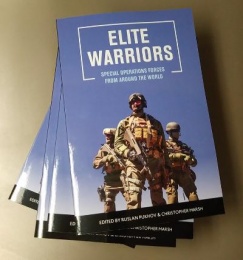Elite Warriors: A Book Review in The Financial Times
 Henry Foy wrote a review of CAST's book Elite Warriors: Special Operations Forces From Around the World for The Financial Times.
Henry Foy wrote a review of CAST's book Elite Warriors: Special Operations Forces From Around the World for The Financial Times. Moscow, a city of monuments, plaques and commemorations, has a new statue. A short walk from memorials to Alexander Pushkin and Sergei Rachmaninoff, and clutching the assault rifle that bears his name, a bronze Mikhail Kalashnikov rises 30 feet above the city.
The statue of a man whose AK-47 rifle kills an estimated 250,000 people each year has caused controversy among Muscovites who prefer the country’s poets, playwrights and composers along their commute.
But Kalashnikov, a former tank commander honoured by Joseph Stalin for designing the AK-47 as a solution to complaints from Red Army soldiers about their guns, is an apt memorial to the belligerent Russia of past conflicts. Today, battalions of thousands of men armed with mass-produced rifles are out; shadowy special forces are very much in.
Ripe time, then, for Elite Warriors, a book that sets out to profile 14 of the world’s special forces, while proposing that the future of warfare will revolve around these units.
Russia has one of the world’s most active militaries. Its troops took part in the Georgian War in 2008, the invasion of Ukraine and annexation of Crimea in 2014, and continue to fight in the war in east Ukraine and in Syria. In each of these conflicts, the country’s special forces have played critical roles, often under a cloak of secrecy or outright denial. The “little green men” in Crimea, of whom Moscow initially claimed ignorance, turned out to be Russian crack troops with their badges removed — a revelation that spooked EU countries on the country’s western border, fearful of attempts on their territory.
While ignoring the oft-profiled Special Air Service of Britain and America’s Delta Force, the book gives particular focus to Russia’s Sily Spetsialnykh Operatsii (SSO), known as Spetsnaz.
Edited by Ruslan Pukhov, a Russian defence expert and director of the Moscow-based Centre for Analysis of Strategies and Technologies, it often strays a little too close to an appeal only to military geeks.
Popular coverage of special forces, the book admits, has mainly derived from “Hollywood and other centres of the film industry that glorify these brave warriors” or “the ‘I was there’ type memoirs that, while interesting, do little to further the social scientific study of special operations.”
Readers looking for context on Russia’s most recent military forays are not disappointed. Pukhov and his co-authors detail the use of Russian special forces to seize the Crimean local assembly building during a night-time operation in February 2014, allowing the election of a pro-Russian leader the next day and setting in motion Moscow’s annexation of the Ukrainian peninsula.
Spetsnaz troops also took part in the seizure of the Syrian city of Palmyra from Isis in March, the book notes, with “targets for [Russian] bombers provided by Russian SSO personnel on the ground”, who were “involved in the actual storming to retake the city.”
First created during the second world war, special forces units were primarily designed for counter-terrorism or specialist missions, such as hostage situations. But Pukhov, who sits on the Russian Defence Ministry’s public council, is clear about their future: they are becoming more important to everyday military activities.
Most striking is the book’s emphasis on how individual countries are seeking to emulate each other in designing their special forces, ensuring a virtual coalescence of strategy, organisation and purpose, and an end to distinct, country-specific unit characteristics.
SAS, Delta Force and Spetsnaz may get most Hollywood screen time, but dozens of other countries have built up well-trained and deployable units.
The implication is clear: less conventional warfare between states of the kind that Kalashnikov designed his rifle for, and more targeted, precise and strategic operations involving far fewer personnel.
The key weakness of Pukhov’s study is that the clear warning is unwritten. At least four of the special forces that the book profiles are active in Syria: Russia, Jordan, Turkey and Iran.
If tomorrow’s wars are to be fought primarily with deniable and secretive elite units, it will become far harder to work out whose side each is on.
Elite Warriors: Special Operations Forces From Around the World, edited by Ruslan Pukhov and Christopher Marsh. East View Press, $39.95
Date: 07.11.2017
